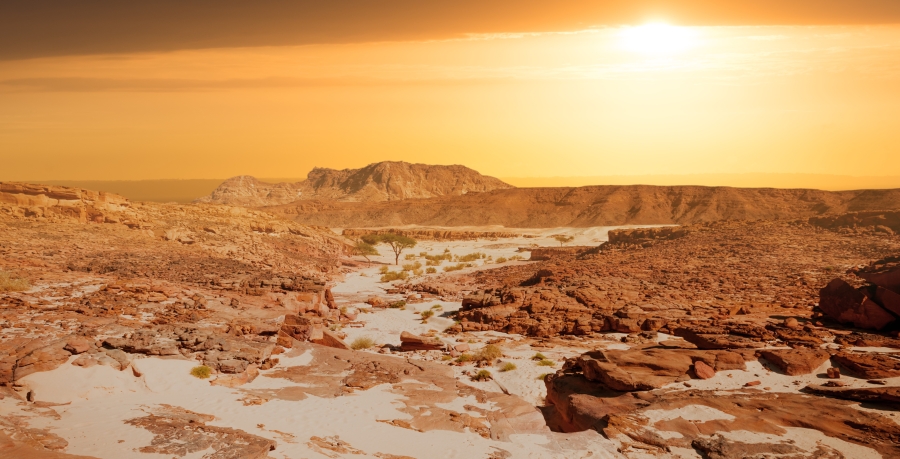The story of the Promised Land first makes its appearance in the Bible, in Genesis 12:7:
“The Lord appeared to Abram and said, ‘To your offspring I will give this land.’”
Exactly what the boundaries of this land were, whether his offspring included Arabs as well as Jews, turned out to be not simply some obscure theological debate but has had real life and death consequences as we see at such human cost today.
The Promised Land made its second major appearance in Scripture with the story of the Exodus when Moses led his people from slavery in Egypt. Crossing the desert, they faced many hardships as well as experiencing miracles. It was there that Moses received the Ten Commandments; there that the Ark of the Covenant with its mysterious powers was built to house them; and there that they finally crossed the sea as its waters parted for them. Though Moses did not live to see it, his people finally entered the “land flowing with milk and honey” as the Bible describes the Promised Land.

The Sinai Desert, pathway for the Biblical Exodus from Egypt to the “Promised Land”.
If we put aside for the moment the issue of its historical accuracy, key elements emerge that make it a story for all humanity:
These themes have resonated down the ages and take us to the next stage in our search.
A New Promised Land
In the Civil Wars that convulsed Britain and Ireland during the 17th century, the story of the search for the Promised Land found a new life. After the defeat and execution of King Charles I, there were religious radicals who identified their struggle with those of the ancient Israelites. Foremost among these was Oliver Cromwell, victorious general and, in the absence of a monarch, England’s “Lord Protector”.
Cromwell saw the godly English as God’s Chosen, freed from the tyranny of royal rule, as the Israelites had been from that of the pharaoh. They were now taking their first steps towards the Promised Land. He set up a “Nominated Assembly”, modelled on the ancient Jewish Sanhedrin, a religious council, comprised of 140 carefully selected godly men. His excitement and apprehension are palpable in his speech at their opening on 4 July 1653:
“Oh, if God fill your hearts with such a spirit as Moses had...That this may be the door to usher in the things that God hath promised; which have been prophesied of; which He has set the hearts of His People to wait for and expect...They shall be "a people called, and chosen and faithful."... Truly seeing things are thus, that you are at the edge of the Promises and Prophecies...”
Sadly for Cromwell, the Assembly failed to live up to expectations. Trying again with his next Parliament, Cromwell addressed them at their opening in 1654:
Moses Parting the Red Sea (chalk, pen & ink and wash on paper) - Luyken, Caspar (1672-1708)
“In truth, the only parallel of God's dealing with us that I know in the world: to Israel's bringing-out of Egypt through a wilderness by many signs and wonders, towards a Place of Rest...And therefore I wish that you may go forward, and not backward”
But this too ended in disappointment. Though some contemporaries had once compared him to Moses, Cromwell’s dreams of founding a new promised land for the godly English were effectively over. Few had shared his vision, and his literal Old Testament understanding of the Promised Land was way off the mark as we shall see. Yet unperfect as Cromwell search was, it opened a new understanding that finding the Promised Land was not just about one event in ancient history: it had a wider meaning.
This idea was taken up by peoples struggling for their freedom, not least in the Civil Rights movement in the USA, culminating in the speech given by Dr Martin Luther King in Memphis, Tennessee, on 3 April 1968, the day before his assassination:
“I just want to do God's will. And He's allowed me to go up to the mountain. And I've looked over. And I've seen the Promised Land. I may not get there with you. But I want you to know tonight, that we, as a people, will get to the Promised Land!”
And so our story might end.
Except there is another story, the real story, of finding the Promised Land.
Finding the Promised Land
Beyond the traditional political and historical understanding, the Promised Land has a deeper spiritual meaning, where we can finally find its truth. The spiritual teacher Peter Goldman once said that Jerusalem was an acupuncture point for the world: a place of great potential healing and therefore tension. When we see Jerusalem at the centre of medieval maps, it is not a sign of geographical ignorance but rather spiritual insight. This in turn opens the door to us for a deeper understanding of the Promised Land, one I have come to awaken to through my travels.

Jerusalem and the area around it have a very powerful spiritual energy. It is a Holy Land. Yet the true Promised Land exists at a higher level, which we can sense as a state of raised consciousness, as infinite joy and love and abundance. And yes, some may experience it as “a land flowing with milk and honey”, as the Scriptures say. For us to attain this Promised Land, we need to work on ourselves spiritually, and there are many ways to do this. Otherwise we can go to the land of Israel and Palestine, see the scenery, visit the sacred sites and admire the view but we will not be in the Promised Land.
We can understand then that the idea that you can slaughter your way to the Promised Land, as described in the Biblical Book of Joshua, or as the Crusaders sought to do in the Middle Ages, or as has been taking place in the Middle East today, is as stupid as it is savage. Yet through our spiritual evolution, one day humanity will take the journey on its own exodus, leave behind all the forms of slavery that tie it down to a lower consciousness, and find the Promised Land that awaits our enlightenment.
By Simenon Honoré
Any views expressed are not necessarily those of Spirit of the Rainbow as a whole.
Discover more about the search for the Promised Land in the book, Testament by Simenon Honoré
If you enjoyed this article, share it with a friend. And why not subscribe to our newsletter?
Popular posts
You might also like
Email Newsletter Our latest articles and offers delivered straight to your inbox.
Our latest articles and offers delivered straight to your inbox.